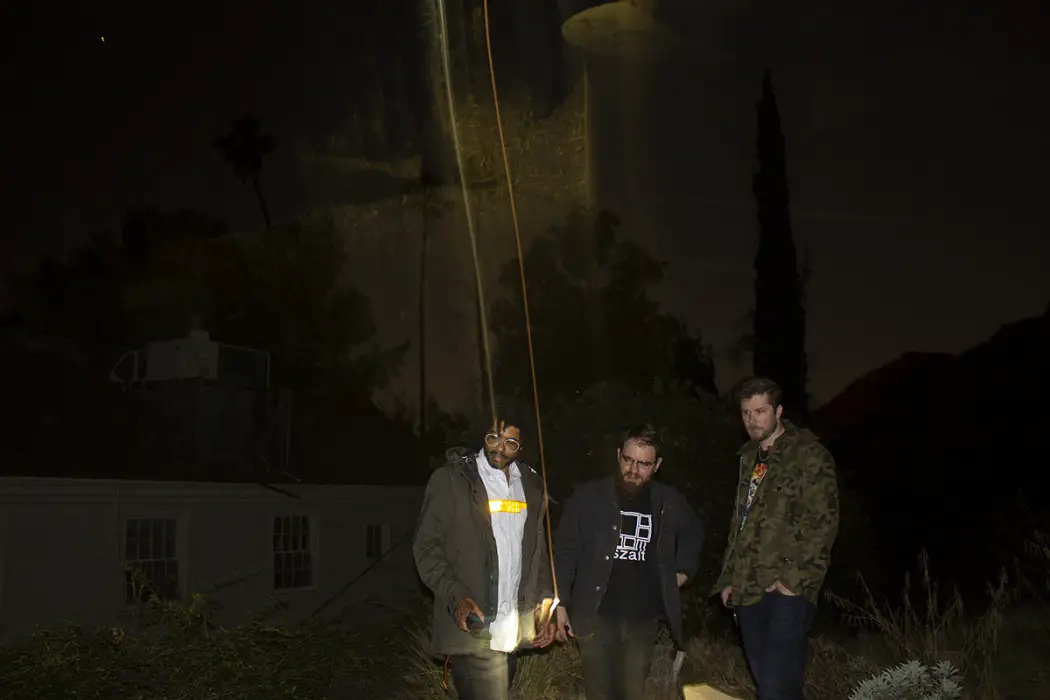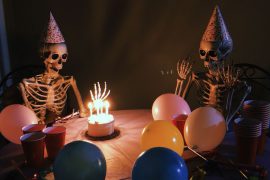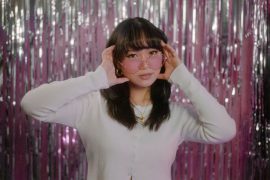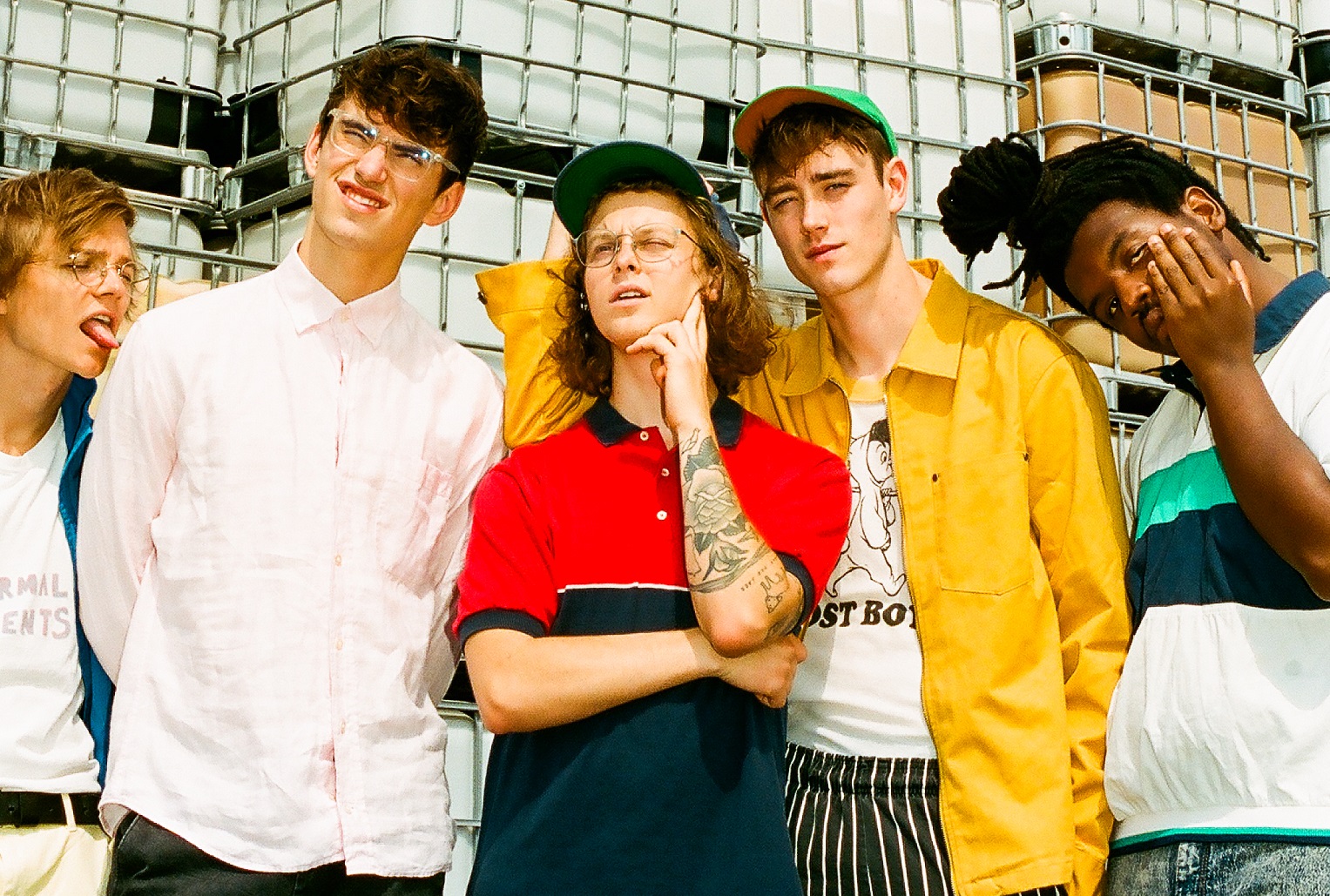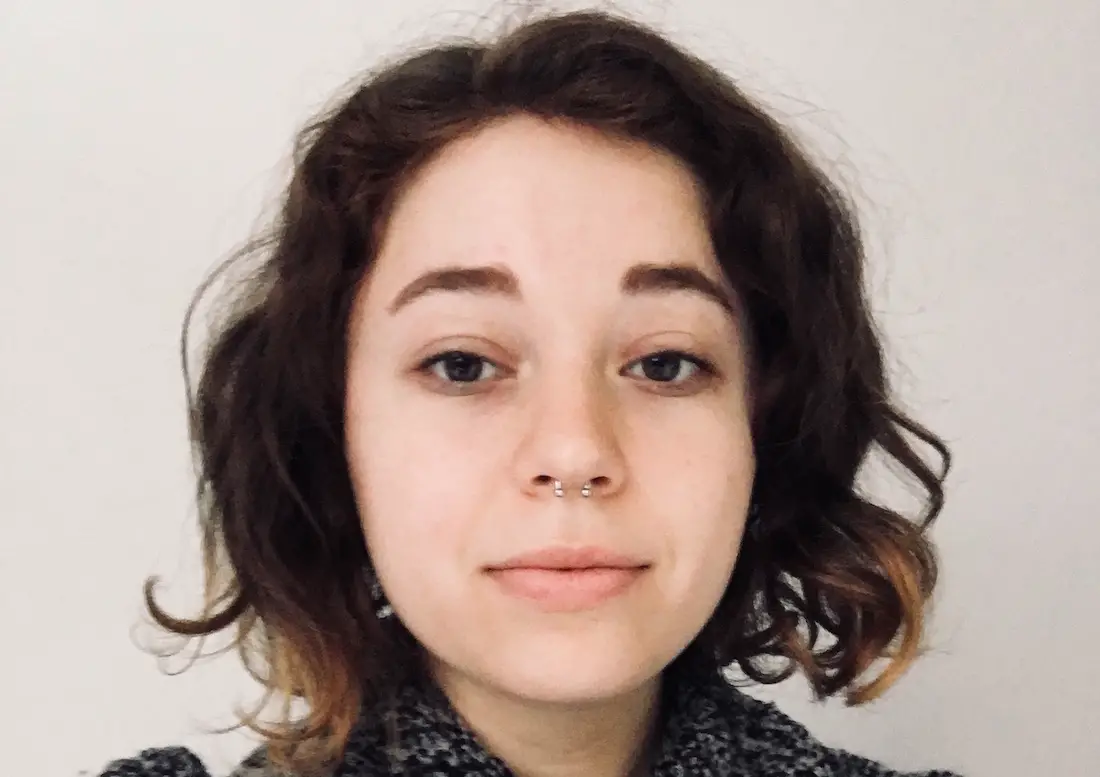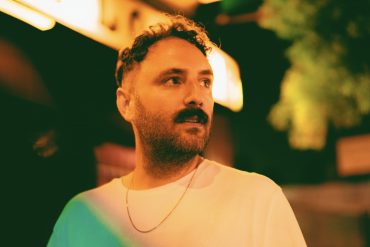Atwood Magazine speaks to clipping.’s producers Bill Hutson and Jonathan Snipes about alternate histories, the strange beauty of noise, and the new book inspired by their song “The Deep.”
— —
On Sub Pop’s website, the first line of clipping’s bio is a quote from legendary science fiction author Octavia Butler: “There is nothing new under the sun, but there are new suns.” Longtime fans of the group know that clipping. have pushed the boundaries of hip hop since their inception. From Daveed Diggs’ virtuosic rapping to the innovative production of Bill Hutson and Jonathan Snipes, clipping. have carved out a new niche for themselves.

Their albums are worlds within themselves – always high concept, always densely detailed and lyrically complex. They’ve been nominated for a Hugo Award and their work has even inspired a book by science fiction author Rivers Solomon. Their music travels through alternate histories and paints strange visions of the future, with Diggs’ knife-edge voice guiding the way.
Their latest offering, There Existed an Addiction to Blood (out October 18 via Sub Pop Records), is a self-described horror anthology – and it’s short fiction at its finest. It’s an album that’s a long time coming, combining the trappings of the horrorcore subgenre with their particular brand of hip hop.
Hutson and Snipes’ industrial production, mixed with Diggs’ storytelling ability, makes for an immersive, tense album. It’s full of static, werewolves, stories of the Black Panther Party, and blood. It opens with a warning: “Nothing is Safe.” It builds and splinters and cracks, all ending on a performance of Annea Lockwood’s 1968 composition of “Piano Burning.” As it all comes crackling down, all you can do is marvel. Atwood Magazine spoke to clipping.’s producers Bill Hutson and Jonathan Snipes about the record and all that comes with it.
Listen: There Existed an Addiction to Blood – clipping.
:: A Conversation with clipping. ::
Atwood Magazine: I know that Splendor & Misery was really high concept. This one is too, but obviously from a very different angle. I‘m wondering what the conversations about this album were like, before you sat down to make it.
Bill Hutson: Not much different from any other one – because also, we’ve been planning this one sort of off and on since we formed as a band. You know, we’d always kind of intended to do something related to horrorcore. It just seemed like that was what our style was leading towards anyways, from the beginning, and you know, one of the first songs that we made for this album we actually made in between turning in our first Sub Pop album and it coming out so that song was actually finished in 2014. And that’s “Club Down,” and we sort of we held that off of Splendor & Misery or any other project because we wanted to build the whole thing around that sort of feeling.
Jonathan Snipes: Yeah, we always knew we were gonna make this record, a horror record. Nobody needed any convincing and it just seemed like a sort of given to all of us. It’s been there so long that I remember when we sort of conceived of it. I don’t remember if it was before or after we made the track “Club Down.” But I do know that we made that and said, “Oh, we should save that to that horror record.” That was the impetus for making the record or if we already knew we were making it before we made that song.
Bill Hutson: But yeah, every time for the last, you know, six years, every time we have an idea that we thought would be for this, we say, “Oh, let’s let’s do it for the horror record.” We would just have these ideas and be like “that one’s for the horror record.” And they were just held over until we had time to work on them. But we’ve been working on all these tracks, I mean, almost all of them were started within a year to six years ago. And then you know, took all this time to actually put everything together and you know, all be together long enough to actually make the record.
So was this ever intended to have a more overarching narrative the way that Splendor & Misery does or are these songs a little more self-contained?
Bill Hutson: I think it was always intended to be more like an anthology or the way that, you know, more like Tales From the Crypt than like a novel or something continuous. I really do think horror is strongest in short story form. It’s like a lot to doing a sort of a collection that could be maybe related, but a collection of distinct narratives was almost always the plan. Because I think that’s the genre. As opposed to science fiction, which I think really works in, you know, multi-volume series as a giant doorstop of books.
It‘s funny that you say that because I‘m honestly a wimp when it comes to horror, and short stories seem to be kind of the only way I can handle them at one time.
Bill Hutson: See I think they’re actually much scarier in short story form because all the tension is there and you know it always ends badly for whoever, you know. Like the problem with horror novels or like even – like this is what I can’t stand about horror television shows that are you know, serialized, or something, you can’t have 12 episodes of a season and be 12 hours long and remain at all scary. It’s always like the first episode is scary and then by the middle of it you’ve just got a soap opera with ghosts fighting in the kitchen about domestic shit or something, and it’s not scary anymore, it’s completely over.
Jonathan Snipes: The more you learn about the world, the more comfortable it becomes and the less possibility there is for something to break the rules of the world, which is what’s scary.
I love horror conceptually and I love reading it, but I can‘t watch it. That‘s kind of my thing. So I really love that this album is so atmospheric and that I can have these visualizations, but there‘s almost more of a dreamlike quality to it than something that I would be watching, which I do think is kind of more frightening in a way. I‘ve always wondered how you approach your work like compositionally, because Daveed obviously isn‘t just rapping over a beat, like he‘s very inside of it.
Bill Hutson: Yeah, I don’t know. I mean, I guess we don’t really know how any other rappers or producers work as intimately but I don’t know that it’s actually all that different. Usually, you know, we’ve started something of a beat that Daveed comes over and listens to. And then he’s just sort of, you know, in the room or goes upstairs with it on his headphones and listens and writes to it while we keep working and then sort of all come together and there’s a lot of editing maybe after he’s done, as well, changes to the beat we make.
Jonathan Snipes: Yeah, we sort of, I mean, we usually kind of know what a song is about when we make our first draft of the beat, or at least what world it sort of lives in, or sometimes we have like, a specific idea for a cadence that we want the rapping to sit in. And sometimes not, sometimes we just make we make a thing. We say, “We don’t really know what this one’s about.” But you think the sound is cool. Everything, you know, sits in the world of what we’re doing and then we’ll all sort of discuss and come up with it. Sometimes we have a very clear idea and will title the beat, you know? In many cases, I mean, like, “Blood of the Fang” was the name of that beat before there were even words. It’s a mishearing of the title of that song that we sampled.
Obviously all of the sounds that you‘ve used on this are very specifically for this horror environment. Now I know that this was done over longer periods of time, was there a way that you planned on approaching the production for this and how you manipulated those sounds?
Jonathan Snipes: I mean, I guess we were a little more constrained in the sounds that we used than usual because we kind of wanted all the sounds to feel a little bit scary and the landscapes of the songs to feel a little more, kind of, desolate or haunting than usual. Like, you know, a song like “Summertime” from CLPPNG was really sort of buoyant and full of life and uses sounds of the ocean and a plane, and also, I mean, smashing light bulbs and feedback. So it’s a lot of the same sources just, you know, we tried to pull our sounds from places that felt threatening or ominous. So my field recordings that I make just kind of lean on the ones that you don’t hear a lot of human activity in them or a lot of daytime activity. It’s the same sort of techniques that we always use, generally.
It‘s interesting that the album starts with “Nothing Is Safe,” which I feel like almost is the safest sounding production wise and then the tension just kind of ratchets throughout until you‘re in that static of “Attunement.” Was that an intentional trajectory, or did that kind of just happen the way it did?
Jonathan Snipes: The trajectory of a track order is always intentional, for sure. I don’t know. We never knew where else we could put “Nothing Is Safe” except the very beginning, because it starts so quietly and so gradually, and it felt kind of so unlike the other things on the record. It still doesn’t sound like a clipping song to me. And I understand why we put on this record and we kind of made it our own, but it still doesn’t obey any of the clipping rules beat-wise that we’ve ever made. And not to say I don’t love it, I’m really proud of it, but it always felt like a weird outlier on the record, and I kind of liked just throwing that at the beginning as sort of a red herring. I guess you’re right, it is it is sort of the safest one of songs, which is funny. I guess if you were to think of the album like a movie, even though we’ve just said it’s not a continuous narrative, the “Intro” is kind of jump scare cold open and “Nothing Is Safe” is kind of the world as normal, and then we break it. But that was certainly not anything we said while we were making the track order.
Watch: “Nothing Is Safe” – clipping.
I feel like with any piece of art, a lot of stuff comes later. It‘s like, you know, the idea of author authority, and what people get from it.
Bill Hutson: Yeah, like something we didn’t notice until well after is that the name Cynthia appears in “Story 7” and also appears in the interlude, that’s kind of a coincidence. Daveed wrote that without really remembering.
Can you talk a bit about the samples that you chose for this? I know the one on “Blood of the Fang” is from the vampire movie. And I think some of this is John Carpenter inspired and I believe there's some samples from him in here?
Jonathan Snipes: No, the only the only actual sample on the record is just the one from Ganja & Hess – or the two from Ganja & Hess – that make up that song. It’s a really strict rule that we never break is that we don’t sample things without giving credit, and being really kind of upfront about what the samples are rather than just grabbing a sample off a record because it has the right vibe, it has to have a really particular cultural connotation and a specific reference that we want people to get.
Watch: “Blood of the Fang” – clipping.
I was going to ask about the “Blood of the Fang” video because obviously that sample feeds into that storyline and the imagery of it is so visceral. I know that the song has a very specific story behind it. Would you mind expanding on that a bit?
Jonathan Snipes: Well, the video was made by a friend of ours, Lars Jan, who’s a theatre and conceptual artist who I started working with last year on one of his bigger theatrical productions, which is a staging of “The White Album,” an essay by Joan Didion. So I don’t necessarily want to speak too much to his like, creative ideas, but we were sort of in discussion. We knew that it needed to be a single and were in discussions about who could make a video for it and there were a lot of ideas being tossed around. And Lars came up just because I spent 2018 talking about what happens with Lars, basically the whole year because there’s a lot about Black Panthers in the Joan Didion essay. She goes to hang out with Eldridge Cleaver and there’s a big section about him and so I finally said, “You know, I don’t think Lars has ever made a music video, but he’s someone I would trust to understand this material and treat it with the right amount of – like, have an interesting opinion about it in a way that I think would support the song.” The idea, I think originally, was that surgery setup was one of sort of four setups that were meant to carry the video and due to time and budget, we moved the narrative into this one surgery setup and really expanded on that. The table of moving blood was sort of both of our ideas. He asked if there was any way in reality to make liquid vibrate with sound, so I sort of built that cymatics table with a bunch of speakers and did all the programming to get it to vibrate and move around. My wife made the two different guns that we use in the video.
Yeah, I made a really weird noise when I saw Daveed take the bite out of that gun.
Jonathan Snipes: Yeah, that was a real like family affair. It felt like the sort of old days where we just did literally everything ourselves, you know, all in the room together. I was, you know, programming the lights while dressed as a surgeon, things like that. It was fun.
A lot of your work focuses on these ideas of alternate histories. What do you all find so powerful about that narrative element? What is it that drives you to that idea?
Bill Hutson: I feel like that’s more of a Daveed question in that he’s the one who actually writes the lyrics.
Jonathan Snipes: Well, I feel like the alternate history of the Black Panther Party that we lay out in “Blood of the Fang” was both of your idea, I guess.
Bill Hutson: It was my idea but Daveed writes the words so like, I think it’s important that that’s, like very clear, even though the ideas for a lot of these stories are mine initially, but the actual writing of them comes from Daveed. I sort of give him like a writing prompt or a suggestion of what a song should be about. And then he actually writes it.
Jonathan Snipes: Sometimes he ignores it. But almost never do we change anything he writes. Like occasionally, he’ll ask us what’s a better word for X or something, but we don’t really give notes. Except occasionally we’ll say, I think this whole thing is wrong (laughs).
But even a spark of an idea can turn into something else. I was able to get an advanced reader’s copy of The Deep, so I just read that. I heard the song originally in the This American Life episode, and then I read Rivers’ first book this year, and was just obsessed. There’s so much of that alternate history in both your song and the book. How much involvement did you all really have with that book? I love what you wrote in the afterward about it being kind of a game of telephone.
Jonathan Snipes: Almost none. I mean, they sent us a draft to give notes on and I think the only notes we gave were, “We love it.” I might have asked them to make it even less like our song (laughs).
Bill Hutson: Yeah, I mean, my input ended after suggesting Rivers as an author, and that was that was as much as it was. It was conceived with Navah, our editor at Saga Press. It was her idea and she and I talked a lot about who could write it. And once Rivers had said yes, that was pretty much my involvement. Well, except for writing the afterward, but our involvement was out of that. From then on it was Rivers’ work. Regarding any of this stuff, you know, I think whether it’s sort of alternate histories or sort of visions of the future, I think always what I sort of think about with respect to this stuff is how these political anxieties become, you know, metaphorized in monsters or visions of the future or allegories for particular situations. And so, you know, a lot of the way we think about these things is going to be as sort of political metaphor, as sort of, you know, what are anxieties right now, what are the anxieties of the world we live in, and how those are sort of expressed either as monsters or science fictional universes or visions of alternative society formation. So it’s not just imaginative for imagination’ sake or something – I don’t even know if that even exists. It’s very consciously political.
When I was reading The Deep, I think I was kind of expecting at first for it to be a bit more of a novel novel like An Unkindness of Ghosts was. But it reads so much more like a fable and a dark fairy tale almost. I mean, it’s obviously very allegorical.
Bill Hutson: Yeah, I think so too. I think that actually, you know, the little things that we like, you know, we sort of discredit, but that is definitely like, because our song “The Deep” is supposed to have that – it takes place in the song itself, but the other end of the song takes place thousands of years after the events it describes. It’s supposed to feel like this mythologized version of the uprising, and I think Rivers picked up on that and made this. It does feel like this sort of almost, yeah, fable folk tale quality.
Coming back to those constraints you were talking about: in the afterward you talk about the banishment of first person pronouns in your music, which is not something I’d ever consciously noticed. But of course, now that I think back, it’s so obvious. You talked about Addiction to Blood as kind of this anthology. Can you talk about that particular constraint in the context of this album, and then why you’ve set these rules for yourselves?
Bill Hutson: When I first came up with that writing constraint for Daveed to try to follow, there were lots of sort of fancy political and theoretical arguments for it. And that’s probably why I thought it was a good idea. But the sort of immediate problem for us that it was solving was that our beats are more aggressive and scarier than Daveed’s actual personality. And the way that the band works, we couldn’t have him pretending to be someone he’s not. And if, you know, Daveed Diggs is rapping about himself and his life, it’s not going to be over beats that sound like “Attunement.” So the constraint was really the only way we could imagine having our best friend, who is a brilliant rapper, collaborate with us on these things. And then it became much more interesting, I think, when no one was really noticing that was what was happening. And I just think that, you know, the history of rap music is sort of a fierce declaration of self-hood. But at the same time, it’s so constrained in what is allowed and who that self is allowed to be. You know, what the sort of broad strokes of every male gangster rapper would be: they brag about having the exact same qualities as every other rapper, but at the same time, fiercely claiming that this is true. This is who I am. This is authentic, I’m not unique and different. So it was sort of interesting to just take the imagery of that without subjective center. Because it just becomes a collection of tropes to use. And it actually was fascinating to see. I think our Sub Pop debut self-titled album was out for like four or five months before anyone even noticed that Daveed never said “I” on the album, that’s why the “I’s” were missing in the title. And months and months later and someone posted a blog post that was like, “Whoa, guys. Did you notice…”
There is that idea of hip hop being a mythologizing of the self. I took a class in college about hip hop, and I remember the professor saying that when you look at country music and its history of violence, and the way that they always told these stories from the first person, it was always assumed to be a story and assumed to be fiction, where hip hop and especially gangsta rap was generally assumed to be the truth of this person's life.
Bill Hutson: Yeah, exactly. No one was worried that Johnny Cash really did shoot a man in Reno (laughs). But now we’re using now we’re using rapper lyrics in criminal trials against them.

I think you’re the first group I’ve ever interviewed that has talked about rules that they have for themselves. I find that a really interesting way to function as a unit. It just feels so much more intentional of an artist’s statement than is typical. Was that something you set out to do or did it come out of being more of a collective rather than a singular artist?
Jonathan Snipes: Well, we started making these beats because Bill had made a remix of a Ying Yang Twins song on a noise tape that another friend of ours made, that I kind of became obsessed with. For whatever reason my iTunes shuffle favored it and I heard it a lot. It was of “Wait (The Whisper Song)” and it was incredibly minimal but it was just really this super high frequency clicking and some very low key hissing, and I just kept thinking this should be a whole project – just rapping over computer music and noise music in a really, really sophisticated, sort of programmatic way where the rapping is the metronome and the music underneath it maybe can feel rhythmic, but does not contain any drums or any melodies. It’s just true noise. It’s not noise rap, meaning that you over-distorted the drum loop, right? Which is I think what most noise rap sort of ends up being. You drove everything really hard, but it’s more or less a rap beat. And we made a handful of remixes following those exact rules, right? No drum sounds, whatever that means to us and no, like, tonal pitched material with no melodies and no harmony. We made a handful of remixes. Daveed heard them, and said “These should be original songs.” And so we started making a handful of songs with him. We almost immediately threw those rules out and obeyed sort of the spirit and not the letter of them because I mean, obviously there are drum sound and melodies and harmonies all over clipping songs now but I think we learned how to how to make things that still – like once we had made a handful of beats using really specifically constrained noise techniques, I think we then learned how to sort of go back and incorporate more kind of conventional songwriting techniques in a way that didn’t didn’t just feel like we were taking a conventional song and running it through cheap mix or way too hot or something. But, we do that too, all the time (laughs).
I think what I meant earlier when I said that Daveed has always felt so inside of the beat was what you just said about the rapping being like a metronome. He is always so rhythmic and so on top of what the beat is, even if what’s happening around him isn’t followable in a consistent way as you would typically think of a hip hop beat.
Bill Hutson: I think we would have never really known that. I think the remix project was important because I don’t think we would have ever known that that was possible if we hadn’t done it first with existing raps. We wouldn’t have let that happen. I think we would have made more conventional beats knowing we were making a beat for a rapper, unless we’d already figured out that it works. And it still sounds like rap if someone raps over something where the rapping is the only clock. We had to figure out that that was even possible.
Jonathan Snipes: I think so too. And we definitely, when we started thought, we’re going to need to make, like, drum patterns to sit in these beats that we play for Daveed when he’s recording that we then take out and we’ve never needed to do that. And we even thought and then we when we thought, “Well, Daveed can do it, but when we’re getting features on these tracks, we’re going to have to do that we’re gonna have to make versions of drums.” I found a few old beats with drums laid in, but basically the features that we’ve gotten nobody’s ever asked for them. Like nobody has ever said, “Oh, I can’t, I don’t know what this is I can’t deal with that.” So, I think we are making things that are, even without the rapping you can hear the rhythm.
In terms of rap features, when you’re inviting people, was there a very specific kind of thing you were going for with this album? Did you have specific people in mind for specific reasons?
Jonathan Snipes: Yeah, we always write tracks really specifically for people. We’re getting at nailing it like, I think at first we had some misses or we like didn’t quite… I think we’re getting a lot better at making a track exactly for who we want and them hearing it and saying, “Oh, I know exactly what to do on this,” and gives us exactly what we want.
Yeah, all the features on this one fit into that atmosphere you’ve created so well.
Jonathan Snipes: Occasionally, we don’t get a feature that we want somebody else but yeah, we always start with a beat.
So you you were kind of mentioning the fact that you don’t necessarily have these typical beats and especially on this record, I feel like it does so much to highlight the story itself and what Daveed is saying. So for both of you: What's your favorite story in this anthology?
Jonathan Snipes: Changes day to day. For me. It’s hard to ever pick like a favorite of things you’ve made. I think, structurally, “All In Your Head” is the most satisfying piece on the record for me. It kind of does things that I sort of want to do in a song. I think that was a beat that we made called “Original Rules” because we said, “Hey, what if we go back to our original rules and don’t use drum sounds and melodies?” And so we made what is the sort of first chunk of that song. And, I don’t know, there’s something really satisfying just about the way that it’s structured in the way that it kind of feels like the beat gets unplugged from itself. That happens rhythmically. And then the last chunk of that, I just love what Sharon (Counterfeit Madison) did on it so much. It’s like, you know, we have these ideas. It’s like “I love the idea” but something in the execution sometimes doesn’t quite work. And even if I’m happy with the way that it turns out, there’s always going to be compromises made. And even if I love what happened, there’s there’s something else to that idea there that either I didn’t quite realize or some part of it just doesn’t fit or didn’t come together, and that one came together exactly in the right way. And I didn’t think it would while we were making it seems that ending seems like a really stupid thing to try and it’s become my favorite thing on the record. I love turning like the concrete error or sounds that you’re always trying to take out of music, like ground hum – sort of taking ground hum and turning it into a bass line and harmonizing it. It’s beautiful. One of my other favorite things that we’ve done that nobody ever talks about is one of the skits on midcity where we – Bill, I think this was your idea – we bleeped out all of Daveed’s swear words and then let the beep turn into a beautiful swelling chord, which I think is so funny and beautiful, it’s really one of my favorite things.
Watch: “All In Your Head” – clipping.
My last question, just for my own curiosity: are the “story” songs connected in some way?
Jonathan Snipes: Yes.
Bill Hutson: Eh…
Jonathan Snipes: Sure. (laughs)
Bill Hutson: In that they’re all called “Story.” I don’t know. I wouldn’t want to say too much about that just because people do devote a lot of energy to figuring stuff out about those songs and I don’t want to encourage that or discourage that (laughs). I’m glad that people like our music enough that they have started to do that kind of a thing. You know, it is the type of thing we do, sort of behind the scenes to encourage people to try to find connections and we do have ideas ourselves that we don’t share with the fans about what connections are between our songs, but then we just try to plant little like traps for people who are looking for that kind of thing. To let their imagination spin regarding any sort of through line.
Jonathan Snipes: Yeah, I mean, I will say, of course, they’re connected. They are connected, of course. But I like to encourage people to look for the connection. But I also like to discourage the idea that there’s a right answer of how they’re connected. And that, like, any sort of statement from us could ever solve any sort of mystery, right? Because we discover new connections when we’re working on them. And, you know, it’s a developing sort of organism. And I like it feeling like a puzzle to solve, but I also don’t like the idea that there’s some sort of solution, that we have the key to.
Bill Hutson: Yeah, well, no, that’s like book club logic. These are not true. So there is no actual story and there are no actual connections. Those songs are the only material there. So it all has to be there or it’s not. You know, book clubs who are like, “Well what do you think the characters did after the book?” Well, fucking nothing because, that’s the book, they’re not real, so nothing [laughs].
Jonathan Snipes: I just feel like we get asked questions like that a lot, you know? And there’s, there’s no…
Bill Hutson: Yeah, but I mean, I like that.
Jonathan Snipes: Draw a connection where you see it, and if you have an argument for it, then it’s true. But it also might mean that some other contradictory connection is also true.
Yes, I mean, it’s like the death of the author philosophy. Like that literary thing where it’s like, “Nope, it's yours now.”
Jonathan Snipes: Yeah, but it’s also still ours. And we’re going to keep adding to that.
Bill Hutson: That’s true. I like the death of the author, but we are still the only authorized, you know, writers of these things (laughs).
Jonathan Snipes: Honestly, if some fan writes a missing story part, I’m all for making canon (laughs).
Bill Hutson: There is some fanfiction out there! There were some twisted Tumblrs with some weird ass stories about us and our characters in the songs.
Jonathan Snipes: That’s not quite what I meant.
Well now you have officially sanctioned fanfiction with The Deep so...
Bill Hutson: Oh yeah, there you go! Thankfully not of the slash variety.
— —
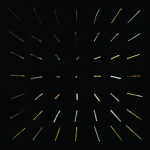
Connect with clipping. on
Facebook, Instagram, Twitter
Discover new music on Atwood Magazine
?© Cristina Bercovitz

